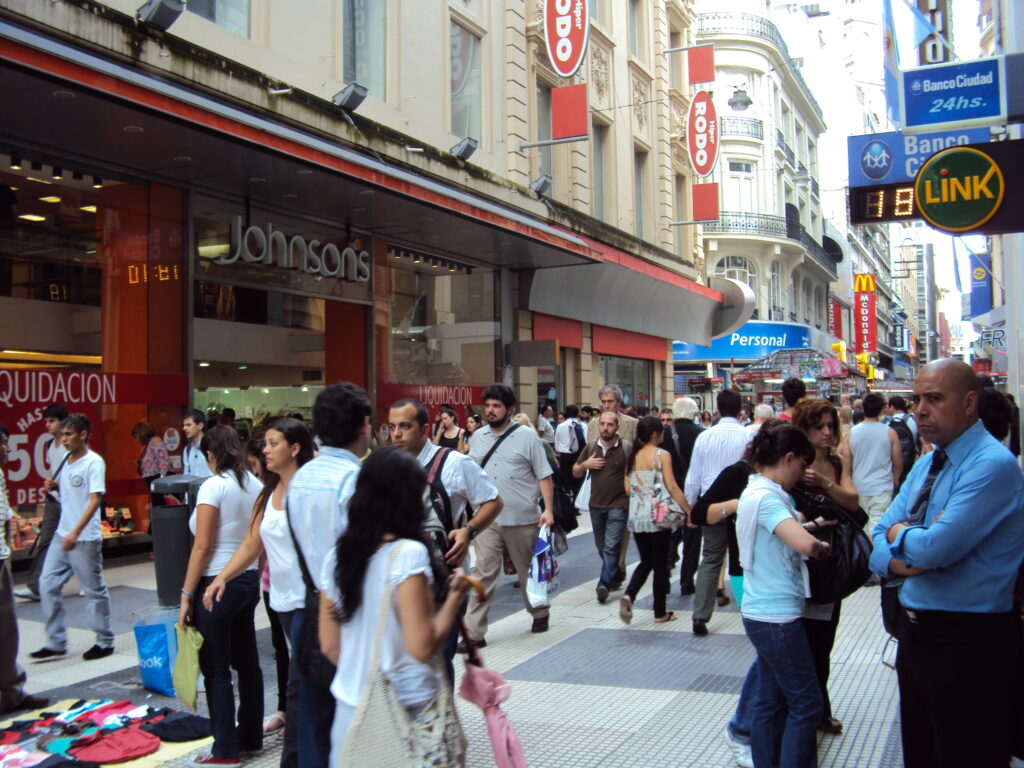Wondering where to exchange your dollars or euros in the bustling streets of Buenos Aires without falling prey to hidden charges or unfavorable rates?
In a city as dynamic as Buenos Aires, staying informed about the safest and most advantageous money exchange practices is crucial for every digital nomad, traveler, and expat.
ExpatPathways invites you to explore our essential guide, brimming with key insights and tailored recommendations, ensuring your financial transactions in Buenos Aires are both secure and beneficial.
Essential data about the currency in Argentina
The Argentine Currency
The national currency of Argentina is the Argentine peso. Interestingly, it shares the same symbol ($) with the US dollar and other dollar currencies, which might cause some confusion.
Prices using the $ symbol denote Argentine pesos, and US dollars are typically referenced as U$S.
As of December 2023, Argentina uses banknotes of 10, 20, 50, 100, 200, 500, 1,000, and 2,000 pesos. Though coins of 1, 5, 10, 25, and 50 centavos, and 1, 2, 5, and 10 pesos are still legal tender, they are becoming rare in circulation.
Plans are underway for the introduction of 5,000, 10,000, and 20,000 peso banknotes to simplify foreign currency exchange and cash transactions, significantly impacted by the country’s inflationary process.
Trends in Exchange Rates
In late 2011, Argentina implemented exchange control measures that significantly reduced capital flight by 85%. A notable outcome was the emergence of multiple exchange rates and a parallel market, commonly referred to as the “blue dollar.”
The blue dollar, trading at a value much higher than the official exchange rate, enables foreigners to get more Argentine pesos for their money. There have been instances of special official exchange rates introduced and then discontinued, aimed at supporting various economic sectors.
From 2019 to 2024, the Argentine peso has depreciated more than 90% against the US dollar, nearly 95% against the euro, and 95% against the British pound.
This depreciation means if your local currency is the US Dollar (USD), Euro (EUR), British Pound (GBP), Swiss Francs (CHF), New Zealand Dollar (NZD), or others, you’ll find it quite advantageous when exchanging to the Argentine peso.
Staying Updated on Exchange Rates
Navigating the complex currency market in Argentina, where the official exchange rate coexists with various “parallel” or “unofficial” rates, can be challenging.
The US dollar, highly sought after by Argentines as a reserve of wealth, has given rise to multiple exchange rates including the “official dollar” set by the Central Bank of Argentina and the “blue dollar” which operates on its own quote and dominates among “unofficial” exchange houses.
Despite official dismissals of the blue dollar’s impact, most economic estimates and business transactions reference the value of this unofficial dollar. To stay informed about daily currency quotes, consider visiting exchange houses, banks, or the official website of the Banco de la Nación Argentina.
Primary Payment Methods in Buenos Aires
Cash
Argentine pesos are predominantly used (with some businesses accepting dollars, though mainly for tips). For those engaging in the parallel market (also known as the Blue market), cash transactions are common.
Exchange in the black market will always result in cash, which can be handy throughout your trip.
While some places only accept cash, many offer discounts for cash payments, so it’s wise to exchange money gradually to avoid carrying large amounts due to the devaluation of the currency.
Tips for Cash Transactions in Argentina
Exchange houses close early on Fridays and remain closed until Monday. Avoid exchanging money at the airport by arranging your airport-city transfer in advance.
If seeking to exchange money on the black market, consult with your accommodation’s owners for contacts. Always have a plan for exchanging money in each destination during your Argentina tour.
Credit/Debit Cards
Visa and Mastercard are widely accepted. Although all businesses are supposed to offer card payment options, some may not, particularly small kiosks or local bakeries. Foreign card payments may benefit from a favorable tourist exchange rate.
It’s advisable to check with your bank regarding foreign transaction fees and consider using traveler-friendly debit cards, which offer official exchange rates without fees.
Despite the inflation, many places now only accept debit cards due to the high cost of credit transactions. In remote areas, carry cash as backup due to connectivity issues affecting card payments.
Bank Transfers
Some businesses prefer bank transfers to avoid tax burdens or transaction fees, often offering discounts for this payment method.
Digital Wallets
MercadoPago is the most widely used digital bank in Argentina, with many businesses accepting payments through this and other digital wallets like Ualá.
While PayPal is accepted in some places, local transactions generally do not support this payment method.
Considering Your Money Exchange Options in Buenos Aires
Beware of ‘Zero Fee’ Services
Although enticing, services boasting ‘no commission’ often compensate by offering less favorable exchange rates. It’s crucial to compare these rates against the mid-market rate to ensure you’re getting a fair deal.
Researching Exchange Rates
Familiarize yourself with the current exchange rate to identify advantageous exchange opportunities.
Avoiding Airports and Hotels for Currency Exchange
These locations typically offer less competitive rates and higher fees. Seek alternatives for better value.
Strategic ATM Use
Investigate if your bank has partnerships with local Argentine banks to minimize fees and inform your bank of your travel plans. However, be cautious of high withdrawal fees and unreliable ATM cash availability in Buenos Aires, opting instead for ATMs labeled “Cajero Automático” for broader accessibility.
Choosing Local Currency for Withdrawals and Payments
Opting for charges in Argentine pesos when using ATMs and card machines can secure more favorable rates and lower fees.
Exchanging Small Amounts
Due to fluctuating currency values, it’s advisable to exchange money in small increments, retaining transaction receipts for potential currency re-exchange.
Small denominations are valuable for transactions where exact change is appreciated.
Managing Leftover Pesos
For significant remaining balances, seek official exchange services, keeping sales receipts for documentation. For smaller amounts, consider spending on souvenirs or transportation.
Tax-Free Shopping for Tourists
International visitors can claim VAT refunds on purchases over AR$70 made at participating stores. Follow the process from in-store documentation to customs validation and choose your refund method.
Exploring Calle Florida for Exchange Opportunities
For those willing to negotiate, this bustling pedestrian street offers informal exchange options. Exercise caution and negotiation skills to secure the best rates, being prepared to visit discrete offices for transaction completion. Always remain firm on agreed rates to ensure fair dealing.

Navigating money exchange in Buenos Aires requires vigilance, research, and sometimes, negotiation. By following these guidelines, you can optimize your currency exchange experience in this vibrant city.
Acquiring Argentine Pesos: Where and How
Cuevas or “Arbolitos” (Money Changers)
In Buenos Aires, particularly on the bustling Calle Florida, you might encounter individuals known as “arbolitos” offering currency exchange. Though they may promise attractive rates, these transactions are illegal and pose a risk.
The term “cuevas” refers to places that operate within the black market, often disguised as regular businesses but offering currency exchange at non-official rates. For safety and legality, it’s advisable to avoid these options.
Official Currency Exchange and Banks
For a reliable, transparent, and secure transaction, opt for official currency exchange houses or banks. These establishments require identification for money exchange and are the safest way to obtain Argentine pesos.
ATMs are also widespread, offering a convenient way to withdraw cash with international cards. Remember to inform your bank of your travel to ensure access and potentially avoid additional fees.
Featured currency exchange houses
Airports and Hotels
While exchanging money at airports or hotels might seem convenient, it’s generally not the best deal due to poor rates and high fees.
Some hotels may offer currency exchange services, but it’s wise to compare their rates to the current market. This option is best for obtaining a small amount of cash until a more favorable rate can be found elsewhere.
Western Union
Sending yourself money via Western Union has become increasingly popular, offering cash pickups at any local Western Union office.
The exchange rate provided often mirrors the more favorable “blue” rate, making it a competitive option against black market rates.
Find here the closest Western Union agencies in Buenos Aires
Virtual Wallets
Applications that facilitate money transfer from PayPal or foreign banks to local bank accounts (traditional or digital) are increasingly utilized.
It’s optimal to have a local intermediary for converting USDT to Argentine pesos, requiring access to a local bank account for the transaction.
Final considerations
Despite its contradictions and currency fluctuations, Argentina is a country that knows how to adapt to new financial dynamics. For any foreigner visiting Buenos Aires, whether an expat, a digital nomad or a tourist, the payment methods will not cause any inconvenience in terms of logistics and financial organisation.
On the one hand, we have an economic situation that makes Buenos Aires very attractive for foreigners. However, on the other side of the same coin, you will find that the difficulties that Argentines have in obtaining foreign currency, especially dollars, are not only due to economic factors, but also to a bureaucracy that will force you to exercise your patience over time. when exchanging money and making payments in Buenos Aires.
Take into account the criteria we have shared with you and try to have a local contact in Buenos Aires. Organising your finances and cost of living in this incredible city will be easier if you have local friends and acquaintances who can save you headaches.
(Featured Image Source: Maxi Gagliano/pexels.com)


